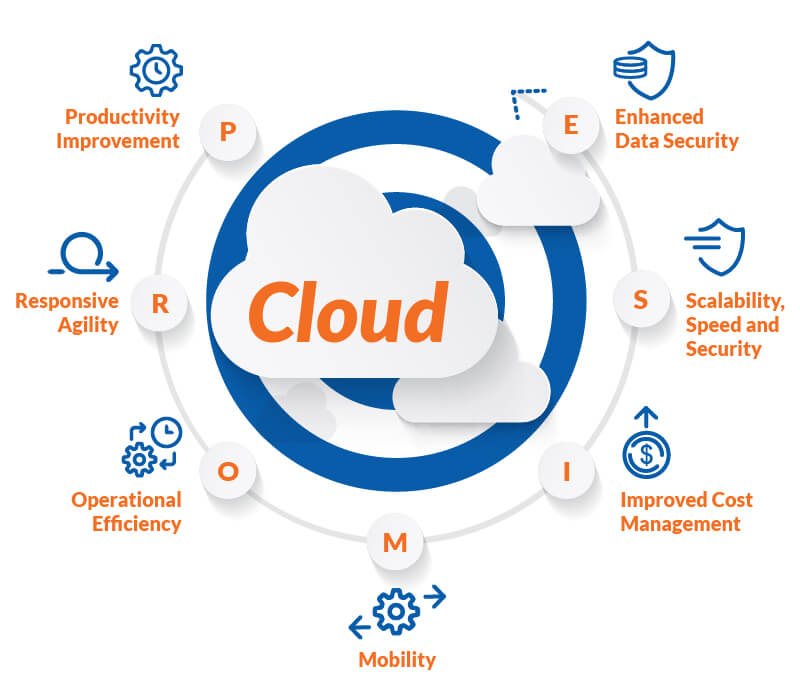Benefits of the Cloud
The cloud has revolutionized the way businesses and individuals store, access, and manage data. In this article, we will explore the numerous benefits of the cloud and how it can transform your operations. With its flexibility, scalability, and cost-effectiveness, the cloud has become an indispensable tool for businesses of all sizes.
Enhanced Data Security
Data security is a top concern for businesses in today’s digital landscape. The cloud offers robust security measures to protect your valuable data. With advanced encryption techniques and regular security updates, cloud service providers ensure that your information remains safe from unauthorized access and cyber threats.
Increased Flexibility
One of the key advantages of the cloud is its flexibility. Unlike traditional on-premises solutions, the cloud allows you to access your data and applications from anywhere, at any time. This enables remote work, collaboration, and seamless integration across multiple devices. Whether you are in the office, on the go, or working from home, the cloud ensures that you have access to your resources.
Scalability and Cost-Efficiency
The cloud provides unparalleled scalability, allowing businesses to easily adjust their resources based on demand. Whether you need to scale up during peak periods or scale down during slower times, the cloud offers the flexibility to meet your changing needs. This scalability also translates into cost savings, as you only pay for the resources you use. With the cloud, there is no need for expensive hardware investments or maintenance costs.
Improved Collaboration and Productivity
The cloud fosters collaboration and enhances productivity within organizations. With cloud-based tools and applications, teams can work together in real time, share documents, and collaborate on projects seamlessly. This eliminates the need for lengthy email chains and ensures that everyone is working on the latest version of a document. The cloud also enables easy integration with other productivity tools, further streamlining workflows.
Reliability and Disaster Recovery
Cloud service providers offer robust infrastructure and redundancy measures to ensure high availability and reliability. With data centers located in different geographical locations, the cloud minimizes the risk of data loss due to hardware failures or natural disasters. Additionally, cloud backups and disaster recovery solutions provide businesses with peace of mind, knowing that their data is protected and can be quickly restored in the event of an unforeseen incident.
Environmental Sustainability
The cloud is not only beneficial for businesses but also for the environment. By migrating to the cloud, companies can reduce their carbon footprint by minimizing energy consumption and hardware waste. Cloud service providers optimize resource allocation, ensuring efficient use of servers and reducing overall energy consumption. This environmentally friendly approach aligns with the growing trend of corporate social responsibility and sustainability.

The benefits of the cloud are undeniable. Enhanced data security, increased flexibility, scalability, cost-efficiency, improved collaboration and productivity, reliability, disaster recovery, and environmental sustainability are just a few of the advantages that the cloud offers. Embracing the cloud can transform your business operations, streamline workflows, and drive growth. Stay ahead of the competition by harnessing the power of the cloud today!
Frequently Asked Questions – Benefits of the Cloud
1. What is cloud computing?
Cloud computing refers to the practice of using a network of remote servers hosted on the internet to store, manage, and process data, rather than using a local server or personal computer.
2. What are the key benefits of using the cloud?
The main benefits of the cloud include cost savings, scalability, increased flexibility, improved collaboration, disaster recovery, and enhanced security.
3. How does cloud computing help in reducing costs?
Cloud computing eliminates the need for upfront infrastructure investments and allows businesses to pay only for the resources they use. It also reduces maintenance and operational costs as the cloud service provider handles these tasks.
4. Can cloud computing improve scalability?
Yes, cloud computing enables businesses to easily scale their resources up or down based on their needs. This scalability allows for efficient resource allocation and cost optimization.
5. How does the cloud enhance flexibility?
The cloud provides the flexibility to access data and applications from anywhere with an internet connection. It allows employees to work remotely and enables businesses to quickly adapt to changing market demands.
6. What role does cloud computing play in collaboration?
Cloud computing facilitates real-time collaboration by allowing multiple users to access and edit shared files simultaneously. It promotes teamwork, enhances productivity, and streamlines communication within organizations.
7. How does the cloud ensure disaster recovery?
Cloud service providers often have robust backup and disaster recovery systems in place. Data stored in the cloud is regularly backed up and can be easily recovered in the event of a system failure or natural disaster.
8. Is data stored in the cloud secure?
Cloud service providers invest heavily in security measures to protect data stored in the cloud. They employ encryption, access controls, and regular security audits to ensure the confidentiality and integrity of the data.
9. Can cloud computing benefit small businesses?
Absolutely! Cloud computing levels the playing field for small businesses by providing access to enterprise-level technologies at affordable prices. It enables them to compete with larger organizations and scale their operations as needed.
10. Are there any disadvantages to using the cloud?
While the cloud offers numerous benefits, it’s important to consider potential drawbacks such as reliance on internet connectivity, data security concerns, and dependency on the cloud service provider. However, these challenges can be mitigated with proper planning and risk management.




